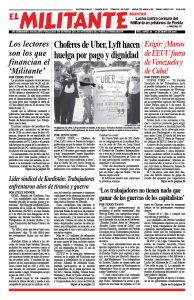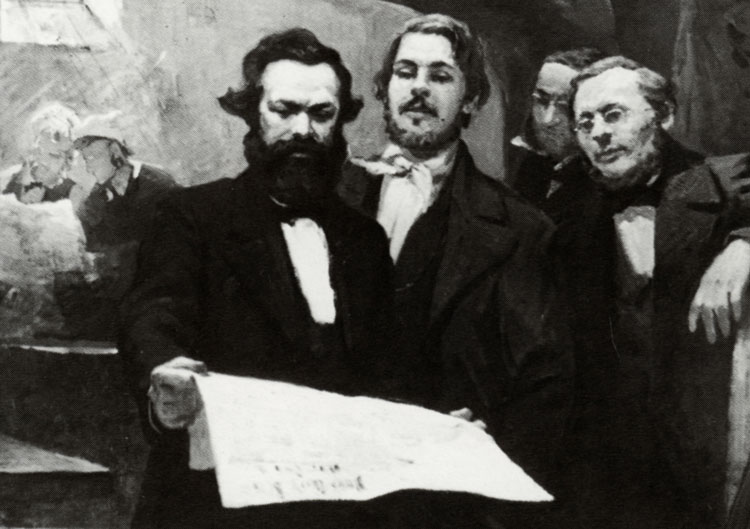The selection this week for Books of the Month is The Communist Manifesto in its Spanish edition. Written by Karl Marx and Frederick Engels, this political pamphlet boldly announced to the world the founding of an international communist workers movement just before revolutions broke out across Europe in 1848. In these excerpts, they explain the relationship of communists to the working-class movement and its history. In his introduction to the new Pathfinder title, Tribunes of the People and the Trade Unions, Jack Barnes, national secretary of the Socialist Workers Party, draws on two of the central points in the piece below. Copyright © 1992 by Pathfinder Press. Reprinted by permission.
and Frederick Engels
All previous historical movements were movements of minorities, or in the interest of minorities. The proletarian movement is the self-conscious, independent movement of the immense majority, in the interests of the immense majority. The proletariat, the lowest stratum of our present society, cannot stir, cannot raise itself up, without the whole superincumbent strata of official society being sprung into the air.
Though not in substance, yet in form, the struggle of the proletariat with the bourgeoisie is at first a national struggle. The proletariat of each country must, of course, first of all settle matters with its own bourgeoisie. …
The essential condition for the existence and for the sway of the bourgeois class, is the formation and augmentation of capital; the condition for capital is wage labor. Wage labor rests exclusively on competition between the laborers. The advance of industry, whose involuntary promoter is the bourgeoisie, replaces the isolation of the laborers, due to competition, by their revolutionary combination, due to association. The development of modern industry, therefore, cuts from under its feet the very foundation on which the bourgeoisie produces and appropriates products. What the bourgeoisie, therefore, produces, above all, is its own gravediggers. Its fall and the victory of the proletariat are equally inevitable. …
[Communists] have no interests separate and apart from those of the proletariat as a whole.
They do not set up any sectarian principles of their own, by which to shape and mold the proletarian movement. The communists are distinguished from the other working-class parties by this only: (1) In the national struggles of the proletarians of the different countries, they point out and bring to the front the common interests of the entire proletariat, independently of all nationality. (2) In the various stages of development which the struggle of the working class against the bourgeoisie has to pass through, they always and everywhere represent the interests of the movement as a whole.
The communists, therefore, are on the one hand, practically, the most advanced and resolute section of the working-class parties of every country, that section which pushes forward all others; on the other hand, theoretically, they have over the great mass of the proletariat the advantage of clearly understanding the line of march, the conditions, and the ultimate general results of the proletarian movement.
The immediate aim of the communists is the same as that of all the other proletarian parties: formation of the proletariat into a class, overthrow of the bourgeois supremacy, conquest of political power by the proletariat.
The theoretical conclusions of the communists are in no way based on ideas or principles that have been invented, or discovered, by this or that would-be universal reformer.
They merely express, in general terms, actual relations springing from an existing class struggle, from a historical movement going on under our very eyes. The abolition of existing property relations is not at all a distinctive feature of communism.
All property relations in the past have continually been subject to historical change consequent upon the change in historical conditions.
The French Revolution, for example, abolished feudal property in favor of bourgeois property.
The distinguishing feature of communism is not the abolition of property generally, but the abolition of bourgeois property. But modern bourgeois private property is the final and most complete expression of the system of producing and appropriating products, that is based on class antagonisms, on the exploitation of the many by the few. …
The communists fight for the attainment of the immediate aims, for the enforcement of the momentary interests of the working class; but in the movement of the present, they also represent and take care of the future of that movement. …
The communists turn their attention chiefly to Germany, because that country is on the eve of a bourgeois revolution that is bound to be carried out under more advanced conditions of European civilization, and with a much more developed proletariat, than that of England was in the seventeenth and of France in the eighteenth century, and because the bourgeois revolution in Germany will be but the prelude to an immediately following proletarian revolution.
In short, the communists everywhere support every revolutionary movement against the existing social and political order of things.
In all these movements they bring to the front, as the leading question in each, the property question, no matter what its degree of development at the time.
Finally, they labor everywhere for the union and agreement of the democratic parties of all countries.
The communists disdain to conceal their views and aims. They openly declare that their ends can be attained only by the forcible overthrow of all existing social conditions. Let the ruling classes tremble at a communistic revolution. The proletarians have nothing to lose but their chains. They have a world to win.
Workingmen of all countries, unite!


